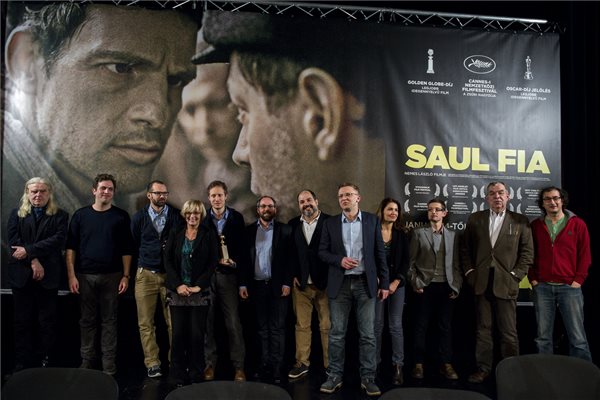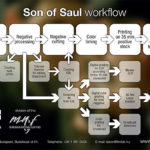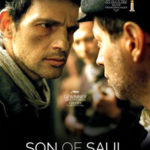“We’ll die because of you” “We’re already dead”
By any standards, Son of Saul is an extraordinary and powerful film, certainly deserving of its Oscar as best Foreign Language movie, but then you’d have to ask why it was not winning the mainstream Oscars. Why should language be a barrier? The question is very apt for other reasons too, which I’ll come to later.
Worth saying that the film justifiably won a host of other 2015 awards around Europe, for which we must once again be grateful for low-budget projects without “stars” but with integrity. Son of Saul has integrity by the bucketload.
The subject of Son of Saul is a Sonderkommando, a particular class of prisoner in Nazi concentration camps, designated by a diagonal red cross painted on his back. Saul has particular duties, including collecting the clothes of the dead and their valuables, drag their bodies from gas chambers and scrub the floors thereafter, plus errands commanded by senior Nazi commanders, and, inevitably illicit packages sent from one prisoner to another.
Saul’s story in the death camp is told in point-of-view style, his face impassive as he observes subhuman horrors and participates in the rituals of mass slaughter and offers deferential respect to the guards. Everything beyond Saul and his immediate surroundings is deliberately unfocused; the film does not glory in the horrors all around but gains a claustropic honestly and intensity found in few other movies on the same theme.
It is not just Saul though: inmate expressions throughout the camp convey emotion in only the most subtle ways, for fear of betraying more than intended; one incorrect reaction spells an instant demise.
What is Saul’s objective? His end will approach soon yet Saul works as though complicity will save his skin. The film concerns the day to day politics of camp life, how keeping your head down and negotiating every hurdle and finding small benefits make survival tolerable while around him those less fortunate die every day.
The survivors become family, conversing in whispers, sometimes bicker, sometimes fight but they all know the grim inevitability of their fate. Passive hope and survival are the only games in town, bribing guards the only reason for any but the most basic possessions.
But Saul, a Hungarian Jew, has not lost the last shreds of humanity, in spite of his situation. He asks a Hungarian doctor not to perform an autopsy on a boy who survived the gas chamber but was asphyxiated by the Nazi physician; Saul asks the Rabbi to give the boy a Jewish burial, but is told to say the words himself.
As part of the same mission, Saul wants to save the rabbi and a man from another Krematorium from death, but doing so means giving up his Sonderkommando jacket and thereby putting himself and his group at risk of slaughter. This is but one example of how civilisation is not degraded and the human spirit not vanquished: he inevitability of death cannot kill that instinct.
And who is the boy for whom he wants to risk everything? His dead son, without whom his life is worth nothing. Later, a rebellion allows Saul and other comrades to escape, but at a price for Saul. His only smile comes when he sees another boy… though I won’t give away the ending, nor the fate of the much loved son.
The film is of great credit to director and co-writer László Nemes, and all the more so since it is his film debut. His passion eventually saw completed a project for which finance was not on offer, precisely because of the subject matter and the director’s unorthodox approach. It is worth repeating this from Wikipedia:
Nemes conceived of the film from the book The Scrolls of Auschwitz, a collection of testimonies by Sonderkommando members, after discovering it during the production of Béla Tarr‘s The Man from London in 2005 when he was working as Tarr’s assistant. Nemes started working on the screenplay with Royer in 2010 and completed the first draft in 2011. The writers spent several years on research, while historians such as Gideon Greif, Philippe Mesnard and Zoltán Vági provided support for the film. Prof. Gideon Greif’s book We Wept without Tears inspired director László Nemes to create a film dedicated to the Sonderkommando, the most delicate, complicated and sensitive topic within the Holocaust.
The project struggled to find its financiers due to the film’s unconventional approach and Nemes’s lack of experience in directing a feature film. Originally intended to be a French production with a French protagonist, the film was produced entirely in Hungary. After potential co-production partners in France, Israel, Germany and Austria turned down the project, the €1.5 million budget was ultimately covered by the Hungarian National Film Fund, Hungarian tax credits and the Claims Conference, accounting respectively for 70%, 25% and 5%.
The authenticity of Nemes’s approach went further in his direction, which must have caused chaos on set with management of the languages but also tells you something you may realise in hindsight about the use of sound to compensate for the restricted visual input:
Nemes insisted on casting actors who spoke their characters’ own languages. New York City-based Hungarian poet Géza Röhrig, who had not acted in film since the 1980s, was cast as the main character, Saul, after being considered originally for a supporting role. The film took five months of sound design. Human voices in eight languages were recorded and attached to the original recording of the production. Sound designer Tamás Zányi described the sound in the film “as a sort of acoustic counterpoint to the intentionally narrowed imagery”.
Röhria‘s largely stoic performance is all the more powerful for avoiding the worst since of acting, notably over-acting. His blank face tells you all you need to know about his life and circumstances. If you could characterise it in words, the granite expression would spell out grim determination. The intensity of performance is matched throughout the cast, mostly actors unknown in the UK, but it is the haunting face of Saul that dominates, by the end white and drained.
This is not a barrel of laughs, but I commend Son of Saul to you as an exceptional film, regardless of its subject matter. Best film of 2015, so far as I’m concerned. Compelling.













